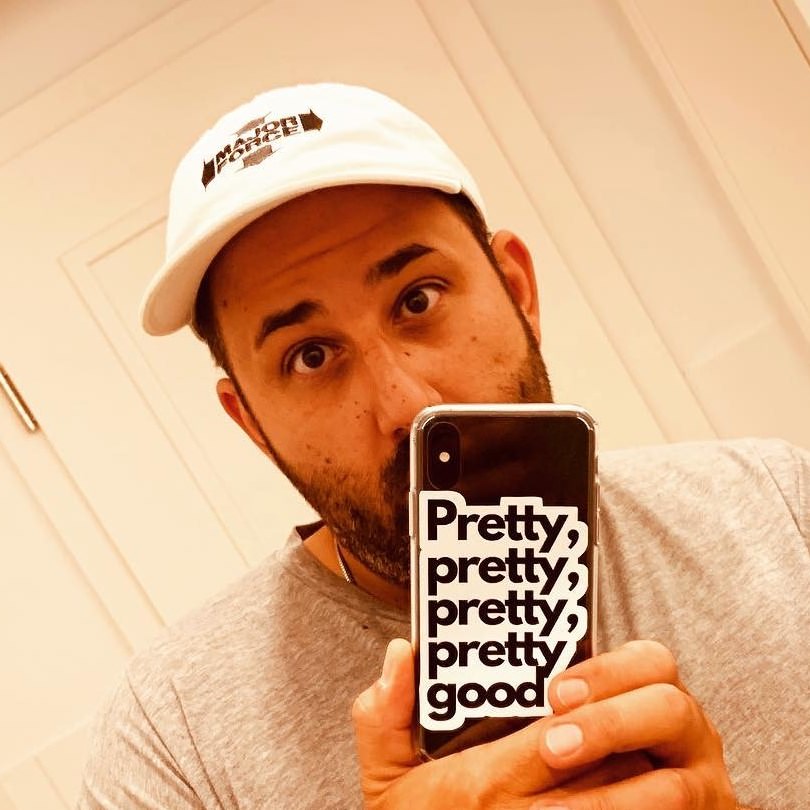For the first of this month’s The Business of Music interviews, we speak with Muallem, booker and one of the owners of Munich club Blitz.
Muallem – David to his friends – has spent his entire working life in dance music, from the age of 15 when he was sneaking into Munich nightclubs. He’s produced and performed under many guises, has DJed across the world and has played a key role in two major Munich clubs, Bob Beaman and his current employers, Blitz. He’s also just launched a new label, Childhood.
On the surface, he appears to have cruised through his clubland career purely on passion and instinct alone. He’s a self-confessed “dreamy guy, an idealist”, for whom business is less interesting than the music and the scene he is so passionate about. However, scratch the surface and you find someone who uses his knowledge and experience to make shrewd business decisions and who is just as committed to organisation and planning as he is to music and clubs.

Attack: Thanks for your time today. First of all, tell us a bit about how you started working in the music industry.
Muallem: I’ve been DJing for perhaps 25 years and everything I do has evolved out of the fact that I”m a DJ. I began playing when I was fifteen, started producing and got into the club business kind of by accident. I got the chance to take over as creative director of a new club so I was able to build a club from scratch and from that position I moved on and started my own stuff.
DJing is my first love and I see all the other things that I do as a result of me being a DJ. I don’t see myself as a business guy; everything I do in terms of all the clubs and the label is basically a consequence of being a DJ
But despite not being a ‘business guy’ you’ve been pretty successful right?
Yeah, the clubs going really well, and I think everything that’s successful satisfies me – so once you’re happy with what you do yourself, it’s kind of a success. I don’t think numbers are the only measure of success.
So your business success is tied into your personal happiness then?
For me it is closely connected, definitely.
The first question you have to ask yourself when you’re working on a label or a club is why am I doing this? And if the answer is ‘I want to make money’ then I think the quality of the result will be in jeopardy
OK, so talk us through the journey from young DJ to club owner and booker:
I was the creative director of Bob Beaman which was a huge success. I kind of was running the whole spot and I had great creative freedom. It was a very special setting because there were three investors who wanted to do a club but had no clue about dance music culture and were looking for someone. I’m very bad at compromising and I can easily let go of things if I don’t feel they match to what I really want to do so I was really straight: I said I can do this but I want to have the last word creatively, no discussion.
So when I started, I didn’t get a high wage, I was basically paid from my DJ sets. But at the time that was ok, I always had this theory of cultural capital in mind. I may not be making much money here but I can make a statement and this can increase my profile so when I catch the right moment I can leave and create my own space – and use what I’ve built before to push all that energy to a new space.
There’s a sense that passion is at least as important if not more important to you than profit – is this the case?
Unfortunately, if you talk to my wife – because she’s constantly mad at me – yes! Somehow I’m not driven by business at all, it’s something that just doesn’t catch my interest, which is sometimes a bad thing as business is important to be successful but I’m a dreamy guy, I’m an idealist: I’m 41 now and when I look back, when I’ve been super passionate about something it always works out in the end. I have so many examples of people who are driven by becoming rich – but the result of their projects is not the best. Not bad, but in order to create something exceptionally good, the people behind it have to really believe in it.
It’s an approach that seems to be working…
So far it’s worked out for me! But the question is also what does ‘worked out’ mean? Maybe if I had approached things differently, I would have way more money now. But I’m also a very analytical guy, I work very strategically and when you start something it’s really important to have a good structure and a system you work on to build things. If you don’t have structure or a system it won’t work. Saying you believe in something doesn’t mean that you don’t have a structural approach and a very professional approach to what you’re doing, they’re not opposites.
The first question you have to ask yourself when you’re working on a label or a club is why am I doing this? And if the answer is ‘I want to make money’ then I think the quality of the result will be in jeopardy.

Have you made any mistakes in your role at Blitz?
Bob Beaman was a 200 capacity club, very small, just like Robert Johnson in terms of size, so you had one or two DJs playing… Blitz is a two-floor club with a capacity of around 800. If you look back at the line ups I created at Blitz in the beginning, they were similar to Bob Beaman and I never booked a big DJ name unless I liked their music. But we had some nights where I realised that the pull of a particular DJ wasn’t enough to fill the club – and that puts real pressure on you.
So there were some mistakes I made in programming. And I also thought that I’d be able to take the people who were following me up until then to the new club. But it’s not as easy as that. You open a new place, it’s a new vibe, people get older and don’t go out anymore, so you have to build an entirely new crowd from scratch – and I underestimated this.
So what changes did you have to make to the business?
We made bigger line-ups. The whole superstardom in dance music that’s evolved over the last few years is something I’m very critical of but still, we did bigger line ups, booked more DJs, bigger DJs and realised that the guests we had on the smaller floors – who were always local DJs – didn’t always work as well.
At Berghain and Panorama Bar the whole thing is one club but every floor has a separate musical identity and both give the same value, and the way the separate parts are treated by the owners, both floors get the same level of attention. And when building the club this is exactly what I did, on the second floor the sound system had to be as good as in the main room but once we opened I didn’t give enough attention to programming the second floor, so this is something I changed and we got it going really well.
When we started Blitz I wanted to run it with no adverts because we’re so cool and have the best club with the best sound system – and I learnt very quickly that you have to engage with people! For every party now, I need to tell a story. Times have changed and especially for the kids, they think more about club nights in terms of events and spectacle. Now we tell a story for every single party, from the moment we announce it, until it takes place. and this approach has changed things.

Muallem’s Three Tips for Business Success
Belief
You have to really believe in your vision. I met so many people on the way who told me it wasn’t possible but I think everything is possible if you believe in it. Just do what you really believe in.
Take Business Seriously
In dance music, it’s hedonistic but it’s also business. In music, there’s a lot of people who behave in business the same way they behave at night and you shouldn’t. Take the whole thing seriously in a professional way. Which closes the circle of what I mentioned before, the blurry line between personal life and business. Try to be as professional as possible.
Knowledge
I think that knowledge is one of the most important things in starting a business. The more you know about something, the more you can make the right decisions. Talk to people who have a lot of experience. Gain knowledge, engage with your subject because without knowledge you can’t make the right decision. I think knowledge is key.
Childhood Recordings‘ first release will be the ‘Vaincre’ EP from DJ Deep, released on September 28th 2020
Muallem is on Soundcloud, Facebook and Twitter.
Save 20% on your distribution with iMusician
Attack has partnered with iMusician to offer our readers a 20% discount across all iMusician services.
To redeem the discount use the code below when using iMusician. Learn more.
Supported by

Founded in 2007, iMusician Digital is a digital music distribution provider serving over 100,000 independent musicians and labels. From heavy hitters like Spotify, Apple Music, and Amazon, to genre-specific shops like Beatport and Traxsource, plus popular regional shops around the world, we make it easy for you to get big globally, no matter where you’re from. With our flexible pricing, no annual renewal fees, and real human support by email and phone, we make it easier for you to become more financially sustainable, so that you can make more music. It’s as simple as that…
About this content.
*Attack Magazine is supported by its audience. When you purchase through links on our site, we may earn an affiliate commission. Learn more.


